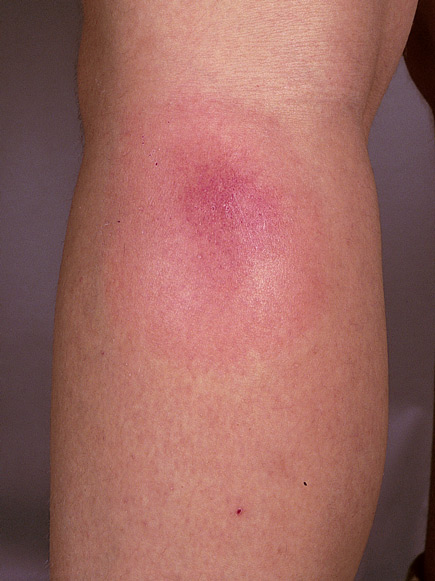MKSAP Quiz: Skin eruption after tick removal
A 22-year-old man is evaluated for a skin eruption on his leg. The patient lives in Virginia and is active outdoors. One week ago, he found a black tick on his lower leg, which his roommate removed with a tweezers. Yesterday he developed diffuse myalgia, neck stiffness, and fatigue. These symptoms have persisted, and today he notes erythema at the site of the previously attached tick.
On physical examination, temperature is 38.1°C (100.6°F); other vital signs are normal. There is no nuchal rigidity. Skin findings are shown.

Which of the following is the most appropriate initial management?
A. Borrelia burgdorferi polymerase chain reaction on skin biopsy specimen
B. Empiric intravenous ceftriaxone
C. Empiric oral doxycycline
D. Serologic testing for Lyme disease
Answer and critique
The correct answer is C: Empiric oral doxycycline. This question can be found in MKSAP 16 in the Infectious Disease section, item 23.
The skin lesion shown is consistent with erythema migrans, and oral doxycycline should be started immediately. Erythema migrans may be due to either early localized Lyme disease or Southern tick associated rash illness. Although these two infections are caused by specific tick vectors with relatively distinct geographic distributions, both ticks are endemic to Virginia. Geographic location is therefore of little value in differentiating between these two syndromes in this patient. However, empiric doxycycline is the recommended treatment for erythema migrans regardless of the cause. Treatment should be given based on the clinical finding of an expansile, target-like skin lesion, particularly at the site of a known tick attachment.
Borrelia burgdorferi polymerase chain reaction testing is not indicated. Although B. burgdorferi may be amplified from erythema migrans skin biopsy specimens if the diagnosis is uncertain, this study is generally not needed because the presence of the characteristic erythema migrans rash, such as is seen in this patient, dictates treatment.
Intravenous ceftriaxone is reserved for patients with cardiac or neurologic manifestations of disseminated Lyme disease.
Serologic testing for B. burgdorferi is not recommended because false-negative antibody assay results may occur in patients with early localized Lyme disease and would be negative in patients with Southern tick associated rash illness.
Key Point
- Empiric oral doxycycline is the recommended treatment for erythema migrans regardless of the cause.




